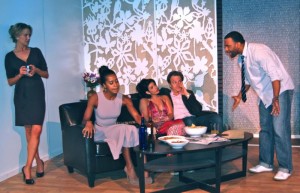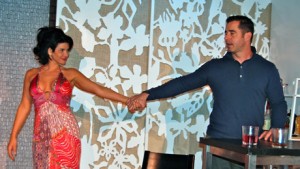IT’S JUST IT’S JUST SEX
Cole Porter wrote sex comedies; Richard Brinsley Sheridan and William Shakespeare wrote them. Michael Frayn wrote them. Georges Feydeau and Arthur Schnitzler wrote them. There’s nothing wrong with sex comedies. A sex comedy can be very funny and therapeutic when it’s done right, and even when it’s done wrong, it can lift the limping spirit. Jeff Gould’s It’s Just Sex, currently enjoying a 21-month run in its third revival, is a very good version of an old, old formula:
Three thirty-something couples prepare to get together for drinks. Then they do get together. Then, a little to their surprise, they swap partners. The swapping has different repercussions for each relationship. The end.
This production works because of a little-appreciated commodity called competence. The actors (Gina LaPiana, Gerald Downey, Jackie Debatin, Caz Harleaux, Kristen Ariza) all are at least competent – which is not faint praise, especially in Los Angeles – and one of them (Salvator Xuereb) is a real comedy talent.

Rick Shaw’s direction serves the actors and Gould’s writing which, as every comedy should and so few do, contains many jokes that consistently cause audiences to laugh out loud. The script also has some nice dramatic elements toward the end, offering slightly more than just amusement, but not enough to drag down the spirit of the evening. The show deserves its outrageously good fortune. And so does its audience. And here’s where the faint praise may start to leak into this review.
 A play that feels this much like a television situation comedy is easy for a snob to dismiss, and I very nearly dismissed it even after laughing a great deal during a matinee. On the way home, I couldn’t remember much about the show I had just seen, and I began to reconsider the quality of good time I had experienced. If a play is only as good as a really good television show, how good could it really be? And if a piece of writing would be as well served in one medium as in another – and It’s Just Sex would work perhaps even better on a screen than it does on stage – is it as valuable or important to see such a thing live, or would it be just as well to wait for the movie?
A play that feels this much like a television situation comedy is easy for a snob to dismiss, and I very nearly dismissed it even after laughing a great deal during a matinee. On the way home, I couldn’t remember much about the show I had just seen, and I began to reconsider the quality of good time I had experienced. If a play is only as good as a really good television show, how good could it really be? And if a piece of writing would be as well served in one medium as in another – and It’s Just Sex would work perhaps even better on a screen than it does on stage – is it as valuable or important to see such a thing live, or would it be just as well to wait for the movie?
 Should one’s valuable playgoing opportunities be spent exclusively viewing stuff that’s inherently theatrical? There’s no shortage of failed screenplays and pilot scripts littering Los Angeles stages. A large part of the huge response to It’s Just Sex has to do with audiences recognizing a known quantity when they see it. It looks and feels like the kind of thing they Tivo every day; it tells them when to laugh, when to gasp, when to feel sad; it is, in other words, accessible.
Should one’s valuable playgoing opportunities be spent exclusively viewing stuff that’s inherently theatrical? There’s no shortage of failed screenplays and pilot scripts littering Los Angeles stages. A large part of the huge response to It’s Just Sex has to do with audiences recognizing a known quantity when they see it. It looks and feels like the kind of thing they Tivo every day; it tells them when to laugh, when to gasp, when to feel sad; it is, in other words, accessible.
 Many hold that the first imperative of theater is that it entertain, and by this measure It’s Just Sex is a winner. It’s not a bad thing that so many people are enjoying this show, coming to live theater and having a high enough time that they might even ride the crest of that positive energy to see another show elsewhere. But is it a great thing that the biggest hit in town leaves your mind before you get home?
Many hold that the first imperative of theater is that it entertain, and by this measure It’s Just Sex is a winner. It’s not a bad thing that so many people are enjoying this show, coming to live theater and having a high enough time that they might even ride the crest of that positive energy to see another show elsewhere. But is it a great thing that the biggest hit in town leaves your mind before you get home?
All these questions must be answered by the individual playgoer. The only concrete complaints I can lodge against this production are that it takes all of twenty minutes to get going, and that the first several scene changes drag for no apparent reason; that two of the three individual-couple set-ups for the main action seem unnecessary, containing information that could have got across just as well later, when everybody gets together; and that if they’re not going to cut fifteen minutes off the top, the show needs an act break right after the couples do their swap. But to judge by the public appetite for the show in its current form, nobody’s going to ask my opinion anytime soon.
It’s Just Sex
Two Roads Theatre in North Hollywood (Los Angeles Theater)
scheduled to end on April 8, 2012
for tickets, visit http://www.tworoadstheater.com/its-just-sex-play
